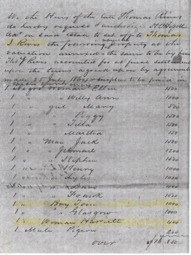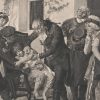African American Genealogy Part IX: Wills, Deeds, and Insurance Policies
This blog series provides information on how to conduct family research — with a special focus on the challenges that apply for African Americans. Our goal is to help you appreciate history, learn how to research your family and be inspired to join a community – Geni.com – that seeks to unite the entire world into one big family. Join us for an adventure that is sure to last a lifetime!
Want to be notified whenever a new article is released in this series? You can subscribe via email or through RSS.
Wills, Deeds, and Insurance Policies
by Sharon Leslie Morgan
Once you find likely prospects for the family who enslaved your ancestors, you will need to dig deeper to see if there are any documents that might list their names. The easiest documents to find will be wills and deed books, which are kept in both county courthouses and state archives. Most of these documents are on microfilm. They have not yet been digitized. I am sure they will be — eventually.
I have had great success finding people this way. Recently, I found a treasure trove of information in deed books. The slaveholder repeatedly used his slaves as collateral for loans — from both individuals and banks. I found more than 100 names. And he was not even the main slaveholder I was looking for. He was the father of someone a white ancestor married. I also found where he made gifts — even before he died — of slaves, to all his children.
What I usually do is a “kamikaze” hit on a courthouse. I arrive, go through all the books and copy everything for everyone who has the surname I want. That way, I can take the information home to study it. I also scour records for neighbors as there was a lot of buying and selling going on. You might find what you want in a place you would not logically think to look. So, whenever you get the opportunity, grab everything you can get. If it doesn’t relate to you, it may relate to someone else. Genealogists are generous and generally have no problem sharing.
For wills, get the will for the head of household as well as others in the family. Money values in the past were vastly different from today. That means somebody you might think of as “poor” today was actually rich enough to write a will to pass on his inheritance. People passed along such simple things as donkeys, spinning wheels, pianos and…. slaves. Consider too that wives often came from slaveholding families, just as their husbands did. Widows are a good source as they were very responsible about passing along to their children what their husbands and fathers left to them. Sometimes, inherited possessions were administered by husbands, but often, the women retained title to them.
Deed books record transactions of land and other possessions. They are recorded in two versions: Grantor and Grantee. You need to look at both. It is in these books that I found numerous records for a slaveholder who repeatedly used his slaves as collateral for loans. The names were repeated over and over again. There is an index in front of each deed book so you can easily find the names. You are then directed to the actual document, usually in another book.
There are also records of slave importations where people were supposed to document slaves being brought across state lines. Few of these records continue to exist, but I know there are some extant for Mississippi, Virginia and Pennsylvania.
Finally, slaves, because they had financial value, were often insured. Some states, in recent times, have started requiring that companies that want to do business with public entities, must report their involvement in slaving. I know that California and Illinois have active programs that require this. I am not sure about other states.
The big idea is that you have to look anywhere and everywhere for just the slightest shred of information. It is not easy to make the connections we long for, but it is possible.
Geni can help you connect with living people who might have research and records that you need.








 Genealogy Discussions
Genealogy Discussions Genealogy Projects
Genealogy Projects Popular Genealogy Profiles
Popular Genealogy Profiles Surnames
Surnames The Geni Blog
The Geni Blog The World Family Tree
The World Family Tree